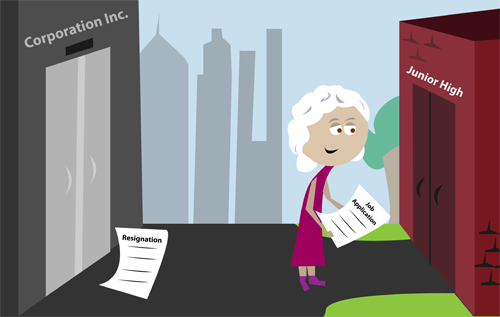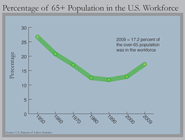
Rethinking Retirement
by Patrick Egan
Some baby boomers, unprepared for retirement, will have to work deep into their 60s and beyond. Others will choose to, because a 20-year vacation seems like anything but fun. In either case, older workers will contemplate new careers, while employers experiment with ways to accommodate and retain employees full of talent, experience and know-how.
As life spans lengthen, traditional presumptions about the appropriate retirement age are shifting. The average 65-year-old man today can anticipate living another 18 years, according to the Social Security Administration; in 1950, his life expectancy was only an additional 13 years. Women average another 20 years.
Eugene Steuerle, an economist at the Urban Institute in Washington, D.C., describes older workers as the nation’s “largest underutilized pool of workers,” likening them to women decades ago. “If Congress would agree that it’s a middle-aged retirement system,” he adds, referring to Social Security, “they would do something.”
Baby boomers are approaching conventional retirement age under perfect-storm conditions. The battered economy has eroded their nest eggs. Policymakers, citing research and proposals from economists and think tanks, are threatening to wean the country from Social Security. And many of today’s workers have invested time and energy in their careers, and value them.
“We’ve all watched our parents and grandparents retiring to Florida, and it doesn’t look that appealing. The boomers have created their identity around work,” says Stefanie Weiss, of Civic Ventures, a San Francisco nonprofit that supports programs to prepare older employees for “encore” careers.
 Elderly population in the U.S. Workforce
Elderly population in the U.S. Workforce
Civic Ventures urges older workers to revisit a question they probably thought they’d left behind: What do I want to be when I grow up? Its Encore Career program supports community colleges with curriculums that train people over 50 for jobs in high school education, medical office management and prisoner re-entry services, to name a few.
“People can be encouraged to work longer by providing fulfilling work,” says Weiss. “Helping them get to those jobs would eliminate the need for punitive measures” — like higher retirement ages that might force working-class people to keep toiling at blue-collar jobs.
Employers will need creative solutions for those people happy with their work, but wanting less of it in their later years.
The North Carolina state university system offers phased retirement — fewer classroom hours, earlier pension payments — to tenured professors, almost 200 of whom participate. MITRE, a nonprofit tech company has enrolled more than 400 retired employees in its Part Time On Call program; they return for short projects in McLean, Va., and Bedford, Mass.
To date, opportunities to use what older workers can offer remain few and might require changes in pension and Social Security regulations. “We need to transition those skills,” says Jeanne Christen, who counsels prospective older students at Rio Salado College in Arizona, a Civic Ventures grant recipient. “I don't think we’ve done a good job of looking at how we can do that.”
-

A Way to Ensure Retirement
Most Americans fail to prepare financially for retirement. One economist has proposed taking the choice out of saving.
-

A Doctor in the House
By reviving a practice from the past — house calls — the health care industry may be able to slash costs even as doctors give greater attention to older patients.
-

From Hospital Halls to Cyberspace
Telemedicine or e-care—technologies including remote patient-monitoring or videoconferencing—may prevent costly emergency room visits, hospital stays and nursing home use.
-

Curing an Ailing Workforce
The health care industry needs millions of additional professionals with better geriatric skills to treat a surging older population. Two innovations are making headway.
-

Finding a Home to Grow Old In
Seniors want to age in place, but most will eventually require care. New senior housing options mix independent living with services as needed.
THIS PACKAGE IN DEPTH
To read about how this story came together and the reporters involved
Click Here.